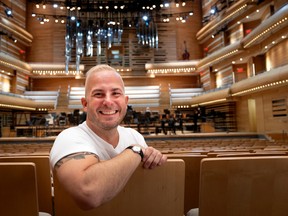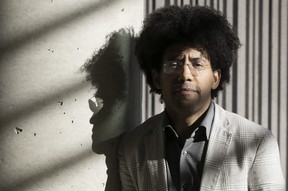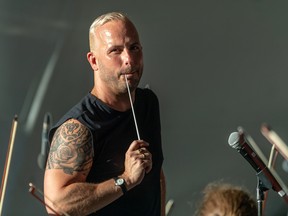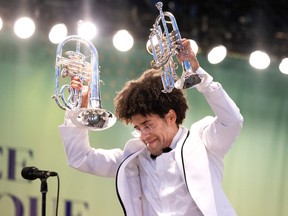The leaders of the Orchestre Métropolitain and Orchestre symphonique de Montréal have different styles, but share a desire to broaden classical music’s reach — and aren’t shy about expressing admiration for one another.

Postmedia may earn an affiliate commission from purchases made through our links on this page.
Rafael Payare and Yannick Nézet-Séguin are friendly competitors. Montreal’s two highest-profile conductors are also colleagues who have occasionally crossed paths on the global symphony orchestra circuit, and they frequently text each other.
The reality is that their two orchestras here, Payare’s Orchestre symphonique de Montréal and Nézet-Séguin’s Orchestre Métropolitain, don’t directly compete with each other. The OSM is far and away the leading orchestra in the city, performing around 80 concerts at the Maison symphonique annually, compared to just 10 or 11 by the OM.
Sign up to receive daily headline news from the Montreal Gazette, a division of Postmedia Network Inc.
Thanks for signing up!
A welcome email is on its way. If you don't see it, please check your junk folder.
The next issue of Montreal Gazette Headline News will soon be in your inbox.
That said, you have to think that the folks running the OSM must be looking over their shoulders at OM artistic director Nézet-Séguin. The Times of London published a feature in August on the much-buzzed-about 47-year-old Québécois conductor — who is also music director of the Philadelphia Orchestra and the Metropolitan Opera in New York — with the headline: “Is Yannick Nézet-Séguin the most right-on conductor in classical music?”
In a recent interview after an OM rehearsal at the Maison symphonique, Nézet-Séguin said there used to be some who engaged in a rather tiresome debate about the two Montreal orchestras.
“It was a question of a mentality that was a little too small-minded — that, ‘Oh, there should only be one orchestra because there’s no space, there’s no funding,’ ” he said. “We don’t discuss this in terms of numbers of newspapers or TV stations or in terms of sports teams. We’ve proven now finally, after many decades, that there should be two orchestras.
“But it can become a very healthy competition in terms of pride for Montreal in terms of having two world-class orchestras. And that is what I feel now with Rafael, who is a friend, who’s a true colleague. I feel that he’s coming into town with the right mindset, that he recognizes our existence and my existence. I can feel that finally there’s going to be some collaboration between the two institutions, thanks to his arrival.
“I couldn’t be happier to have him as a colleague and a healthy competitor. That’s what’s great. The more of an offer of quality music that we have, the more it’s for the benefit of everyone in Montreal.”

In an interview at the OSM’s offices just beside the Maison symphonique, Payare added to the love-in between the two conductors.
“He’s wonderful. I have so much respect and admiration for him,” said Payare. “Of course everyone knows who Yannick is in the musical world. We finally met last year, in New York at Carnegie Hall. I was going to do a concert with his orchestra, the Philadelphia Orchestra. He knew who I was. There was one time he was touring with (the) Rotterdam (Philharmonic Orchestra) and he got injured in his back. There was a concert in St. Petersburg and I did that concert. I replaced him.”
Nézet-Séguin calls it a friendly competition, but Payare doesn’t like to think of it as a rivalry.
“That’s ridiculous,” said Payare. “Why? There’s no reason for that. I live in Berlin. There are nine orchestras there. It just says a lot about what this beautiful city has to offer. (Montreal is) a true cosmopolitan city where you get different offers for different things. Whatever you want to do, go! There’s something happening every day.”
The conductors are two cool dudes who also happen to be cool-looking dudes. Payare has the big afro, and offstage you’ll often see him sporting bright red running shoes. Nézet-Séguin is rocking punkish bleached-blond hair, and at the OM’s big free show at the foot of Mount Royal this summer, he conducted while wearing shorts and opened the soirée by filming the crowd with his phone to make an Instagram story. The day we met, he was wearing designer sweatpants, white T-shirt and gleaming white sneakers.
“He has the hair,” Nézet-Séguin said of Payare. “We have different personalities. But in terms of how I developed, I think that if you look at old pictures of me with the OM, you can see me already with blue hair and red hair. I’ve always wanted to be myself, and I feel we all have our own road to this. And Rafael is coming from a different background. But he still wears his red shoes, which I find cool.”
“The particularity of Yannick working with the OM musicians is that it’s really his family,” said Jean Dupré, CEO of the OM. “He’s been principal conductor and artistic director for the last 22 years with the OM, and this orchestra was founded by the musicians for the musicians 41 years ago. So it’s a completely different dynamic within the orchestra. The relationship Yannick has with the musicians is not just a professional relationship — it’s a family relationship. They are very close and he knows them so well, he can push them over their limits.
“The challenge was being able to support Yannick’s audacity. He was always bringing stuff from left field, always different because he believes in some principles and values important to him and important now to the orchestra, like diversity and inclusion.”

OSM CEO Madeleine Careau said Payare is incredibly important to the orchestra.
“The music director is the admiral of the ship, and he’s the image of the orchestra,” said Careau. “He’s the one who decides about programming. He’s the one who decides how the musicians will play. … He’s the dominant figure of the orchestra. So it’s very important people identify themselves with the music director.
“He’s part of the community. … He inspires the audience. He attracts sponsors. He attracts tours, recording companies. The orchestra doesn’t play the same under Rafael Payare as it did under Kent Nagano. He brings his personality.
“We wanted to choose someone who would be a portrait of Montreal. He’s Latin, but also he’s a world citizen. He comes from Venezuela. He was working in Belfast. He was working in San Diego as music director of the orchestra. He was living in Berlin. He was travelling all over the world. He is the perfect person to identify himself with Montreal.”
Of the two conductors, Nézet-Séguin is more openly analytical about himself, whether it’s regarding his musical style or his look. Payare brushes off such questions. During an encounter this summer, when I told him he looked like a rock star, Payare shrugged and said he didn’t know how to respond to that. In our recent chat, I noted how expressive he was at the podium when conducting the OSM in a vibrant performance of A Midsummer Night’s Dream by Mendelssohn in late September.
“Sorry about that,” said Payare.
I told him there was no need to apologize, that people love that expressive style.
“I don’t watch myself,” he said. “I have no idea what I do when I’m on the podium. I just try to be very faithful and truthful to the music. I really cannot say what that is. I just study the score. That’s what I do. I cannot say that I have this style or another.”
It was fascinating to watch Nézet-Séguin on stage at the OM’s free show in the field just east of Mount Royal in August. He spent a big chunk of time introducing each piece of music, often joking around but also giving some historical context. He spoke about 19th-century French composer Louise Farrenc before they performed two movements from her Symphony No. 3.
One of Nézet-Séguin’s passions is to shine a light on the work of female composers and composers from minority groups. He chose Inuk singer-songwriter Elisapie to participate in the OM’s first concert of this season, and for the Philadelphia Orchestra he has been deeply involved with the work of Florence Price. Price’s Symphony No. 1 had its première in 1933 and was the first symphony by an African-American woman to be played by a major U.S. orchestra. Nézet-Séguin and the Philadelphia Orchestra released an album of Price’s Symphonies Nos. 1 and 3 this year.
“I’m a conductor who wants to inspire change, and that’s what I’m doing at the moment with all the diversity of our programming, trying to give a voice to under-represented parts of our society in our classical music field,” said Nézet-Séguin.

Payare’s passion is attempting to democratize classical music and bring it to the widest possible audience, which is directly tied to his own background. Growing up in the Venezuelan port city of Puerto la Cruz in a working-class family, Payare never even heard classical music as a young kid. He credits where he is today to El Sistema, a publicly funded after-school music education system in Venezuela that now includes over 700,000 students.
He says he would love to bring a program like this to Quebec.
“The OSM has been doing this wonderful concert (annually outside the) Olympic Stadium, and that is something that is open for everybody,” said Payare. “They can try (the OSM) and maybe they will come (to the Maison symphonique). We also play the concerts in the parks. We also want to add education to that. So maybe we can have an El Sistema Québécois.”
He began playing the French horn when he was 14, which only happened because his older brother was part of El Sistema. His brother was listening to Tchaikovsky’s 1812 Overture one day in his room, and Payare heard it and flipped.
“The sound that caught my attention was played by the horns,” he said.
Nearly 30 years later, Payare has just begun his first season as the music director of the OSM and wants to take the orchestra in new directions. That includes highlighting the music of the New World, which he and the OSM did at the Olympic Park concert this summer; they performed a program titled The Many Colours of the Americas, which included Canadian Indigenous tenor and composer Jeremy Dutcher and Trinidadian soprano Jeanine De Bique.
As for Nézet-Séguin, he’s just excited to be working with three great musical outfits in the OM, the Met and the Philadelphia Orchestra.
“It’s a dream career,” he said. “I’m living my dream that I had when I was a child, and on a much bigger stage than I ever imagined. Arguably the two most important (musical) institutions in the United States, with the Met and Philadelphia under my guidance, and here making a marvel out of the Orchestre Métropolitain, which evolved into a major actor in the international scene after being so local.
“I’m still in my mind at the beginning of my journey. I want to influence how classical music is going to be shaped in the next decades.”
Playing for the Queen
Yannick Nézet-Séguin was in London preparing for a concert with the Philadelphia Orchestra when news broke that Queen Elizabeth had died. That evening’s concert at the Royal Albert Hall was immediately cancelled, but the BBC asked Nézet-Séguin and the orchestra to perform God Save the Queen so the network could broadcast it. And so they did, allowing the audience into the hall for the brief performance.
The orchestra had rehearsed the British national anthem just in case the Queen died. They also performed Edward Elgar’s Nimrod from his Enigma Variations, a piece that is often played at funerals.
“I feel we were there to support the British people in their mourning,” said Nézet-Séguin. “When we think about the Queen, we think about every event in our lives, no matter how old we are. … Seventy years. She was always there for everything.
“For me, it was being connected to something that had to do with rituals. The rituals in life are important, I feel. We don’t talk about this enough, but rituals connect us, for better or worse. We are coming from something centuries ago that had to do with wars and domination, which has to do with rituals and kings and queens. Somehow it resonates with each and every one of us.
“Of course with our brains we can try to rationalize and (wonder) how relevant is the monarchy in the 21st century. But (her death) was very emotional and it connected us to our roots. It’s a moment in history that we’ll never forget, and to be there and being the ones having the honour of playing that anthem was very significant.”
bkelly@postmedia.com
twitter.com/brendanshowbiz
-

A tale of two orchestras: comparing the OSM and Orchestre Métropolitain
-

Analysis: New OSM music director Payare shifts Montreal's orchestral dynamic
-

Nézet-Séguin now a lifer with the Orchestre Métropolitain


